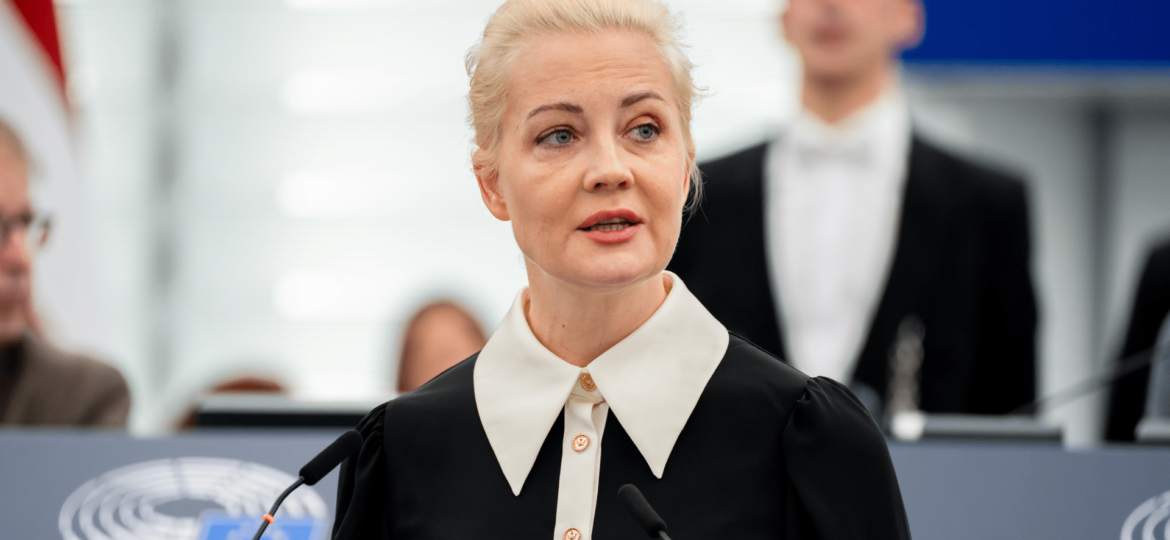An analysis of the EDMO fact-checking network. Organizations that contributed to this analysis: Pagella Politica/Facta news; 15min; AFP; BNT Provereno; Correctiv; Demagog.cz; Demagog.pl; DPA; EFE Verifica; Ellinika Hoaxes; Faktabaari; Greece Fact Check
The news of Alexei Navalny’s death was aired by Russian channels on the 16th of February. Navalny was long the most prominent face of Russian opposition to President Vladimir Putin and he died while incarcerated for political reasons in a maximum security corrective colony in Siberia. Western leaders were substantially unanimous in attributing the responsibility of this death to Putin’s regime, aside from the specific dynamics of Navalny’s departure.
His wife, Yulia Navalnaya, published a video address on the 19th in which she vowed to continue her late husband’s political work for a “Free Russia” and called on Russians to rally around her.
Disinformation undermining Mrs. Navalnaya was already circulating on pro-Putin channels before Navalny’s death, but gained traction in the EU immediately after and, once she stepped up as an aspiring leader for the Russian opposition, slander through false content only grew stronger.
An “immoral woman”
One of the first false content detected by fact-checking organizations that are members of the EDMO fact-checking network consisted of images allegedly showing Yulia Navalnaya flirting with other men. This strategy is built on gender biases and sexist stereotypes and it is very common – in many different countries across the globe – when women are targeted.
A first image, allegedly showing “Navalny’s grieving widow in the company of her new companion” circulated in many EU countries (e.g. France, Germany, Hungary, Greece, Lithuania, Poland). The picture is actually from 2021, the man portrayed with Navalnaya is Yevgeny Tchitchvarkine (a 49-year-old Russian billionaire and opponent of Putin), and the original caption reads “With the first lady of the beautiful Russia of the future @yulia_navalnaya Photo by: #моябоеваяподруга Freedom @navalny!”.
Tchitchvarkine was also the subject of a different image, in which Navalnaya is allegedly hugging him, that circulated in the abovementioned countries but also in additional ones like the Czech Republic or Italy. In this case, the photo was doctored: in the original version, the man hugging Navalnaya was his husband Alexei. Tchitchvarkine was added with a photomontage.
The Russian billionaire was not the only man that Yulia Navalnaya was accused of betraying her late husband with. The Bulgarian investigative journalist Christo Grozev was mentioned in a false story, widely spread in Bulgaria and in other countries, accusing Navalnaya of sleeping with powerful men to gain support for Navalny’s foundation FBK. An image circulated to support this allegation, allegedly showing a joint hotel reservation for Grozev and Navalnaya: but the image was again a photomontage.
The account that originally shared this false story was allegedly a former employee of FBK, Anna Gonchar, but she does not exist: her profile was made up, and her image was a deepfake generated using a stolen image of a Maltese girl.
An “evil opportunist”
Disinformation about Yulia Navalnaya, clearly aligned with Kremlin’s interest in demolishing the public figure of a potential leader for the opposition against Putin, was not just accusing her of being an “immoral” woman.
The false story about the American psychologist Paul Ekman, allegedly stating that her reaction to the news of Navalny’s death shows her “happiness” for finally being the center of attention of the whole world instead of grief, sends the message that Yulia Navalnaya has a lot to gain from her husband’s death and she is cheerful for this unexpected “stroke of luck”.
Another content, widely spread in the EU (detected in February in the Netherlands, Germany, Austria, Croatia, Greece, Cyprus, Estonia, Spain, France, Lithuania, Bulgaria, Finland and Italy), goes even beyond. In a recorded audio the mother of Alexei Navalny, Ludmilla Navalnaya, appears to accuse the widow Yulia of basically being responsible for the death of her son. According to this audio, it was Yulia that “forced” Alexei to go back to Russia when he “just exited the coma and was incapable of evaluating the situation”. And of course it was not for the greater good. The audio, which repeats the accusation to Yulia of seeing other men, accuses the widow also of having “forced” Alexei to transfer to her his bank accounts.
The audio is false and AI-generated. The voice of Navalny’s mother was cloned, using a video from February 22 when Ludmilla publicly exposed Russian authorities for pretending to bury her son in secret and for blackmailing her about it.
Conclusion
Lies and slander about Yulia Navalnaya went viral in the EU as soon as her name became known to the European public, after the death of her husband Alexei Navalny and her decision to pick up the baton. This way, people that were not familiar with her figure were exposed to a narrative that portrays her as an unfaithful opportunist, exploiting her husband’s death for her own interest. Similar tactics of “character assassination” were already used in the past, e.g. to discredit the Ukrainian president Volodymir Zelensky, depicted by pro-Russia disinformation as a corrupt drug-abuser with Nazi sympathies.
Some tools used to create content that conveys disinformation narratives are becoming more and more sophisticated, e.g. through the use of AI, and assessing the truth is getting more time-consuming for experts and fact-checkers. There is the concrete risk that many that have been exposed to lies will not be equivalently exposed to their debunking, and opinions on Yulia Navalnaya now formed on false basis will survive for years to come.
Tommaso Canetta, deputy director of Pagella Politica/Facta News and coordinator of EDMO fact-checking activities
Photo: Flickr, European Parliament
